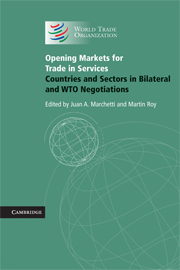Book contents
- Frontmatter
- Contents
- List of figures
- List of tables
- List of boxes
- List of contributors
- Foreword
- Acknowledgments
- Disclaimer
- Summary and overview
- PART I From Policy to Negotiations
- PART II Multilateral and Bilateral Negotiations on Services: Overall Perspectives
- PART III Challenges, Issues and Opportunities in Services Sectors
- 4 Telecommunications: can trade agreements keep up with technology?
- 5 The liberalization of cross-border trade in services: a developing country perspective
- 6 Out of stock or just in time? Doha and the liberalization of distribution services
- 7 Air transport liberalization: a world apart
- 8 Financial services liberalization in the WTO and PTAs
- 9 Beyond the main screen: audiovisual services in PTAs
- 10 The liberalization of postal and courier services: ready for delivery?
- 11 The liberalization of energy services: are PTAs more energetic than the GATS?
- 12 Market access for the government procurement of services: comparing recent PTAs with WTO achievements
- 13 A warmer welcome? Access for natural persons under PTAs
- PART IV Country Experiences with Services Trade
- Index
- References
13 - A warmer welcome? Access for natural persons under PTAs
Published online by Cambridge University Press: 05 December 2011
- Frontmatter
- Contents
- List of figures
- List of tables
- List of boxes
- List of contributors
- Foreword
- Acknowledgments
- Disclaimer
- Summary and overview
- PART I From Policy to Negotiations
- PART II Multilateral and Bilateral Negotiations on Services: Overall Perspectives
- PART III Challenges, Issues and Opportunities in Services Sectors
- 4 Telecommunications: can trade agreements keep up with technology?
- 5 The liberalization of cross-border trade in services: a developing country perspective
- 6 Out of stock or just in time? Doha and the liberalization of distribution services
- 7 Air transport liberalization: a world apart
- 8 Financial services liberalization in the WTO and PTAs
- 9 Beyond the main screen: audiovisual services in PTAs
- 10 The liberalization of postal and courier services: ready for delivery?
- 11 The liberalization of energy services: are PTAs more energetic than the GATS?
- 12 Market access for the government procurement of services: comparing recent PTAs with WTO achievements
- 13 A warmer welcome? Access for natural persons under PTAs
- PART IV Country Experiences with Services Trade
- Index
- References
Summary
In comparison to the other three modes of supplying services under the GATS, few market opening commitments have been undertaken by WTO members with respect to the movement of natural persons – mode 4 – as a result of the Uruguay Round and subsequent extended negotiations. This begs the question: have WTO members been more forthcoming in their PTAs?
This chapter aims at providing an answer. It first briefly discusses issues related to the definition and measurement of mode 4. Second, it summarizes the overall level of mode 4 liberalization currently granted by WTO members in their GATS commitments and provides an overview of the improvements found in members' initial and revised offers. This sets the general background against which market access granted for mode 4 in recent PTAs is assessed, in the third section. A final section attempts to draw some conclusions.
What we know about the supply of services through the movement of natural persons
What does mode 4 encompass?
This section examines the scope of mode 4 under the GATS. Though somewhat technical, the exercise is rendered necessary in order to fully understand the precise coverage of mode 4, and in light of the structure that will be adopted in the examination of mode 4 concessions in PTAs.
- Type
- Chapter
- Information
- Opening Markets for Trade in ServicesCountries and Sectors in Bilateral and WTO Negotiations, pp. 475 - 502Publisher: Cambridge University PressPrint publication year: 2009
References
- 9
- Cited by



